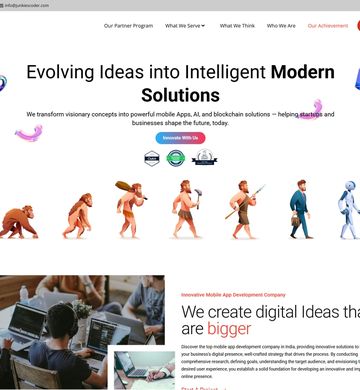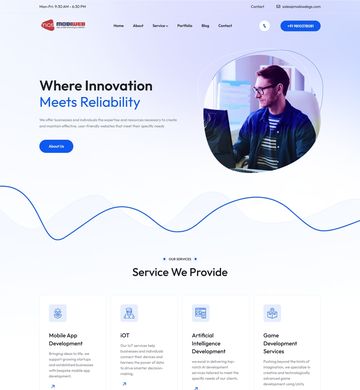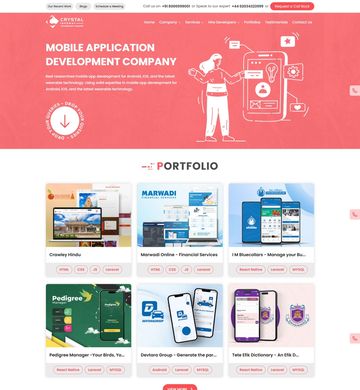Business Client need Web Development
Contact person: Business Client
Phone:Show
Email:Show
Location: Northampton, United Kingdom
Budget: Recommended by industry experts
Time to start: As soon as possible
Project description:
"Full-Stack Developer for “Hardware Compatibility Playbook” (SQL + Modern Web Front End + Optional Voice Search/Input)
A tech business that refurbishes, upgrades, and resells professional IT hardware — mainly laptops, desktops, and workstations from brands like Dell, HP, and Lenovo requires this play book to capture a growing product knowledge.
This project is to create a standalone system — our Hardware Compatibility Playbook — to record and query information about cross-compatible parts, upgrade options, and repair knowledge gathered in-house.
Project Goal
Develop a searchable, data-driven web application (hosted on DigitalOcean SQL) that:
Stores detailed compatibility, parts, last prices and supplier data
Lets staff quickly answer questions like
“Does the Dell Precision 5560 share its chassis with the M660?”
"How easy is it to replace the screen on a Lenovo Thinkpad P14S Gen 2 i7-1165G7?"
“What top covers fit the Lenovo P15 Gen 2?”
“Can you upgrade FHD to 4K on the Lenovo P16 Gen 1?”
Gradually builds knowledge automatically as engineers process real units
Core Features
SQL Database (MS SQL or MySQL on DigitalOcean) with normalized schema for models, parts, compatibility, suppliers, prices
Modern Web UI (React / [login to view URL] / Vue preferred)
Fast Search across models & part numbers (fuzzy matching + filters)
Data Entry / Edit interfaces for models, parts, alternates, suppliers
Cross-reference links (“equivalent”, “requires adapter”, etc.)
CSV Import / Export
Extras:
Barcode / QR scanning via webcam
Voice search using Web Speech API
“Learning” Enhancement
As engineers handle units, they’ll log part numbers, alternates, prices, and notes.
The system should then:
Remember which parts fit which models
Retain supplier & price history
Suggest required / optional parts for any new model
Generate a ready-to-order list with cost roll-up
Tech Stack & Skills Required
Backend: MS SQL or MySQL (+ API endpoints)
Frontend: React / [login to view URL] / Vue (+ TypeScript preferred)
Search Engineering: indexes, fuzzy search, faceted filters
CSV Pipelines & Data Importers
Auth / RBAC / Audit Log
Bonus: Web Speech API, barcode scanning, AI/NLP search, IT hardware familiarity
Deliverables
Hosted working prototype on DigitalOcean
Normalized SQL schema (+ sample data)
Responsive web UI with search + CRUD functions
Role-based access and audit log
CSV import / export
Setup & usage documentation
Timeline & Budget
Duration: ≈ 5–7 working days (MVP)
Budget: £400 – £900 fixed-price, depending on polish & extras
Future phases: intake wizard, price memory, barcode scan, voice search, semantic lookup
To Apply
Please include:
Examples of SQL-backed tools you’ve built
Your preferred stack and why
Estimated delivery time and cost
A short note on how you’d handle cross-references or voice search
=================================
Part 2 — “Living Project Brief” for Developers
This document is both a formal project brief and a narrative walk-through.
It explains what to build, why, and how it will be used.
1 Overview
The Hardware Compatibility Playbook will be an internal knowledge system for engineers and buyers.
It records and cross-references every model and part we handle — screens, keyboards, top/bottom covers, mainboards, batteries, PSUs, etc. — showing which parts fit which models, what alternates exist, and how easy certain upgrades or swaps are.
Over time, it will become the definitive in-house “compatibility brain” for the business.
2 Objectives
Centralize model / part compatibility data
Enable instant, fuzzy search and clear visualization of relationships
Capture knowledge automatically from day-to-day processing of units
Track supplier pricing & availability for each part
Reduce repeated research, improve refurb throughput, and guide purchasing decisions
3 Functional Requirements
Area Requirement
Data Model Normalized SQL tables for models, parts, compatibility links, suppliers, prices, intake sessions
CRUD UI Add/edit models and parts with autocomplete and validation
Search UI Fuzzy lookup by model name, part number, alias (instant results)
Cross-Reference View For any model → show BOM, alternates, equivalents
Intake Wizard Engineers log real unit details → updates part mapping and prices
Supplier Panel Displays latest prices and preferred suppliers
Export Generate CSV for purchasing or stock imports
Optional Extras Barcode scan, voice search, image upload for part photos
Auth / Audit Role-based permissions and audit logging for changes
4 Proposed Schema
models (id, brand, series, model, generation, cpu_gen, notes)
parts (id, category, mpn, aliases, description)
model_parts (id, model_id, part_id, required, qty, fit_notes)
compatibility (id, from_part_id, to_part_id, relation, note)
suppliers, supplier_prices, intake_sessions, intake_lines, audit_log
Indexes on MPN and model name for speed; consider a view for “where-used” queries.
5 Front-End Design / UX
Aesthetic: Clean industrial style (UI should feel like an internal ERP tool).
Tech: React + TypeScript + Tailwind recommended.
Main Views
Dashboard / Search: Global search bar + recent activity
Model Detail: Specs, compatibility table, required parts, alternates
Part Detail: Where used, price history, alternates, supplier panel
Intake Wizard: Step-by-step part logging per unit
Admin Tools: Imports, aliases, deduping, user roles
Extras:
Barcode icon → launch camera for scan
Mic icon → speech search
Instant filters (brand, category, generation)
6 Development Phases
Phase Duration Key Deliverables
1 – Schema & API 2 days Database design + REST / GraphQL endpoints
2 – Core UI 3 days Search, CRUD screens, cross-reference views
3 – Enhancements 2 days CSV import/export, auth, audit
4 – Optional Extras 3–5 days Voice search, barcode, intake wizard
7 Testing & Handover
Test dataset of ~50 models + 500 parts
Performance checks on search latency (< 300 ms)
Basic role testing (admin/engineer/viewer)
Full documentation + ERD diagram
Final review meeting via video or chat
+++++++++++++++++++++++++++++++++++++++
Narrative Walk-Through
Imagine an engineer receives a Dell Precision 5550.
He opens the Playbook, searches “5550”, and instantly sees:
Same chassis as Precision 5560
Compatible FHD and 4K panels (listed with part numbers and cables) + complexity of the job
Top cover shared with model XPS 15 9500
Bottom case not interchangeable due to vent pattern
Typical parts needed for A-grade refurb (hinges, keyboard, battery)
Supplier prices from the last 30 days (Refurbit, PCParts UK, etc.)
He scans the serial or speaks “add Dell Precision 5550 unit”, and the system opens an intake form pre-filled with required parts and costs.
Purchasing staff later search “Precision 5550 screen” → instantly see approved part numbers, suppliers, and prices.
Over time, as more data is logged, the Playbook turns into a powerful reference for pricing, repair planning, and cross-model engineering.
===========================
Future Ideas
AI assistant to answer free-text queries
Integration with Linnworks or Amazon catalogs
Predictive part recommendations
Reporting dashboard (KPIs on part usage & failure rates)
Success Criteria
Runs smoothly on DigitalOcean stack
Usable by non-technical staff
Near-instant search & filtering
Clean UI and logical schema
Easy to extend for AI or inventory links" (client-provided description)
Matched companies (3)

Junkies Coder

SJ Solutions & Infotech
